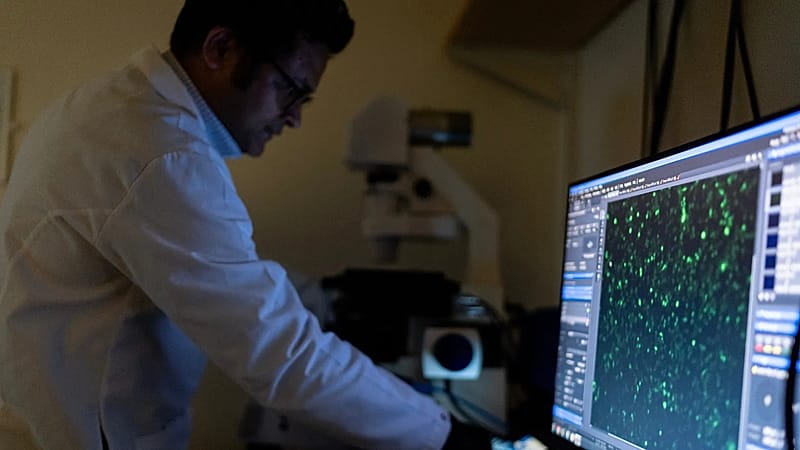What to know about autoimmune diseases, who’s at risk, and why treatment is so hard

Our immune system has a dark side: It’s supposed to fight off invaders to keep us healthy. But sometimes it turns traitor and attacks our own cells and tissues.
What are called autoimmune diseases can affect just about every part of the body – and tens of millions of people. While most common in women, these diseases can strike anyone, adults or children, and they’re on the rise.
New research is raising the prospect of treatments that might do more than tamp down symptoms. Dozens of clinical trials are testing ways to reprogramme an out-of-whack immune system.
Furthest along is a cancer treatment called CAR-T therapy that's had some promising early successes against lupus, myositis and certain other illnesses. It wipes out immune system B cells – both rogue and normal ones – and the theory is those that grow back are healthier.
Other researchers are hunting ways to at least delay brewing autoimmune diseases, spurred by a drug that can buy some time before people show symptoms of Type 1 diabetes.
“This is probably the most exciting time that we’ve ever had to be in autoimmunity,” said Dr Amit Saxena, a rheumatologist at NYU Langone Health in the United States.
Here are some things to know.
What are autoimmune diseases?
They’re chronic diseases that can range from mild to life-threatening, more than 100 with different names depending on how and where they do damage. Rheumatoid arthritis and psoriatic arthritis attack joints. Sjögren’s disease is known for dry eyes and mouth.
Myositis and myasthenia gravis weaken muscles in different ways, the latter by attacking how nerves signal them. Lupus has widely varied symptoms including a butterfly-shaped facial rash, joint and muscle pain, fevers, and damage to the kidneys, lungs, and heart.
They’re also capricious: Even patients faring well for long periods can suddenly have a “flare” for no apparent reason.
Why autoimmune diseases are so difficult to diagnose
Many start with vague symptoms that come and go or mimic other illnesses. Many also have overlapping symptoms – rheumatoid arthritis and Sjögren’s also can harm major organs, for example.
Diagnosis can take multiple tests, including some blood tests to detect antibodies that mistakenly latch onto healthy tissue. It usually centres on symptoms and involves ruling out other causes.
Depending on the disease, it can take years and seeing multiple doctors before one puts the clues together.
There are efforts to improve: The National MS Society is educating doctors about newly updated guidelines to streamline diagnosis of multiple sclerosis (MS).
How the immune system gets out of whack
The human immune system is a complex army with sentinels to detect threats like germs or cancer cells, a variety of soldiers to attack them, and peacemakers to calm things down once the danger is over. What’s key is that it can distinguish what’s foreign from what’s “you,” what scientists call tolerance.
Sometimes confused immune cells or antibodies slip through, or the peacemakers can’t calm things down after a battle. If the system can’t spot and fix the problem, autoimmune diseases gradually develop.
Autoimmune diseases are often set off by a trigger
Most autoimmune diseases, especially in adults, aren’t caused by a specific gene defect. Instead, a variety of genes that affect immune functions can make people susceptible.
Scientists say it then takes some “environmental” trigger, such as an infection, smoking, or pollutants, to set the disease into motion.
Scientists are zeroing in on the earliest molecular triggers. For example, white blood cells called neutrophils are first responders to signs of infection or injury – but abnormally overactive ones are suspected of playing a key role in lupus, rheumatoid arthritis, and other diseases.
New research links a virus to lupus
Among infectious triggers, scientists already know the Epstein-Barr virus can set some people on the path to multiple sclerosis – and new evidence links it to lupus, too.
Just about everybody gets that virus by young adulthood and after the initial infection, it still hides out, inactive, in the body.
Stanford University researchers found a hiding place is in a tiny proportion of the immune system's B cells. They found that occasionally, in some people, the virus nudges certain B cells into an inflammatory state that can spur an autoimmune chain reaction.
The research doesn’t explain why 95 per cent adults have been infected with Epstein-Barr yet only a small fraction of the population gets lupus. But it's a new clue into how infections can have a lasting impact on the immune system.
Women are at highest risk for autoimmune diseases
Women account for about four in five autoimmune patients, many of them young. Hormones are thought to play a role.
But also, females have two X chromosomes while males have one X and one Y. Some research suggests an abnormality in how female cells switch off that extra X can increase women’s vulnerability.
But men do suffer from autoimmune diseases. One especially severe one named VEXAS syndrome wasn’t discovered until 2020. It mainly affects men over 50, and in addition to typical autoimmune symptoms it can cause blood clots, shortness of breath, and night sweats.
Certain populations also have higher risks. For example, lupus is more common in Black and Hispanic women. Northern Europeans have a higher risk of MS than other groups.
Treatment for autoimmune diseases is complicated
According to investment research company Morningstar, the global market for autoimmune disease treatments is $100 billion (€87 billion) per year. That’s not counting doctor visits and such things as lost time at work, given treatment is lifelong.
Not so long ago, there was little to offer for many autoimmune diseases beyond high-dose steroids and broad immune-suppressing drugs, with side effects that include a risk of infections and cancer.
Today some newer options target specific molecules, somewhat less immune dampening. But for many autoimmune diseases, treatment is trial and error, with little to guide patient decisions.

